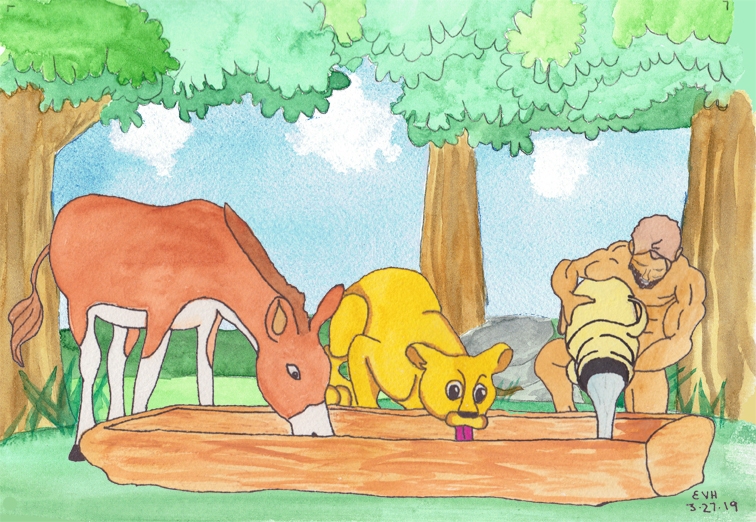
Jataka 124
Amba Jātaka
The Fruits of Selflessness
as told by Eric Van Horn
originally translated by Robert Chalmers, B.A., of Oriel College, Oxford University
originally edited by Professor Edward Byles Cowell, Cambridge University
This is a lovely but simple story of how goodness, virtue, and selflessness can bring their own rewards. Prosperity often comes to those who are most generous. People who live lives of compassion and selflessness often – ultimately - benefit from it. But it takes a leap of faith and heart to act in a way that in the short term may appear to be to your own detriment. But ultimately, doing the virtuous thing is always the right thing.
“Toil on, my brother.” This story was told by the Master while he was at Jetavana. It is about a good brahmin who was from a noble Sāvatthi family. He was very devoted to the Dharma. He ordained as a member of the Saṇgha, and he was diligent in his duties. He was devoted in his attendance on his teachers. He was scrupulous in the care of food and drink. He was meticulous in the performance of the duties of the Dharma Hall, the monastery’s bath house, and so forth. He was perfect in the observance of the 14 major and the 80 minor disciplines (the rules of the monastic code, or “Vinaya.”). He used to sweep the monastery, the cells, the walkways, and the path leading to their monastery. And he gave water to thirsty people.
Because of his great goodness lay supporters regularly gave 500 meals a day to the monks. The monastery gained a great reputation. The many monks in the monastery prospered because of the virtue of this one monk.
One day in the Dharma Hall the monks started talking about how that one monk’s goodness had brought them gain and honor and filled so many lives with joy. Entering the Dharma Hall, the Master asked, and was told, what their conversation was about. “This is not the first time, monks,” he said, “that this monk has been diligent in the fulfilment of duties, In days gone by 500 recluses going out to gather food were supported on the benefits that his goodness provided.” So saying, he told this story of the past.
Once upon a time when Brahmadatta was reigning in Benares, the Bodhisatta was born as a brahmin in the north. When he came of age, he gave up the world and lived at the head of a group of 500 recluses at the foot of the mountains.
In those days a great drought came upon the Himalaya country. Everywhere the water dried up, and great distress fell upon all living things. Seeing the poor creatures suffering from thirst, one of the recluses cut down a tree that he hollowed out into a trough. He filled this trough with all the water that he could find. In this way he was able to give the animals something to drink.

Figure: Selfless Compassion
The animals came in large herds and drank and drank until the recluse had no time left to go and find food for himself. Ignoring his own hunger, he worked tirelessly to provide water for the animals. They thought to themselves, “This recluse is so busy taking care of us that he does not have time to go in search of food for himself. He must be very hungry. Let us agree that everyone of us who comes here to drink brings as much food as he can to the recluse.”
They all agreed to do this. Every animal that came brought mangoes or guavas or jack fruit or the like, until their offerings would have filled 250 wagons. There was food for all 500 recluses with plenty to spare. Seeing this, the Bodhisatta exclaimed, “Thus one man’s goodness has supplied food for all these recluses. Truly, we should always be dedicated to doing the virtuous thing.” So saying, he uttered this stanza:
Toil on, my brother. Persevere in hope.
Do not let your courage flag and tire.
Do not forget him, who by his own fasting
Reaped benefits beyond his heart’s desire.
Such was the teaching of the Great Being to the band of recluses.
His lesson ended, the Master identified the birth by saying, “This monk was the good recluse of those days, and I was the hermits’ master.”
